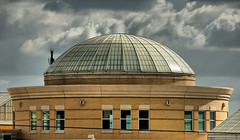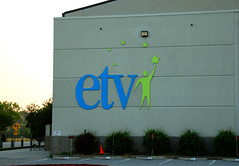Today was a jam-packed day. I had three sessions back to back, then it was time to drive home. There was one last session on basic Google Earth, then two on Geotagging. Yesterday during the late afternoon I had drive around Columbia snapping pictures so that I would have some shots for tagging.
The first session went well, then it was a mad dash to the other ETV building for geotagging. It was a small room, so we had a rather information demonstration/discussion. Both sessions went very well, and my photos showed up in Google Earth exactly like they were supposed to.
For all three sessions I had people show up who were not on my list of participants. These had signed up to attend a blogging workshop, but found out that ALL blogging sites were blocked in their district. Therefore, they decided to come to my session instead as a safe alternative. While I didn’t mind them joining us, I think I would have still gone to the blogging session, then tried to educate whomever was doing the blocking at their district with the new knowledge I gathered there.
The topic of blocking access to Web 2.0 resources tended to be a common theme at these meetings. I’ve written about my thoughts on the matter here several times (Censorship, Blocking Blogs, Blocking Blogs Revisited, The Blocker’s Dilemma.) Even before this meeting, there had been a heated discussion on the South Carolina Media Specialists listserv regarding this issue. The general attitude was one of outrage against “those IT folks who don’t have any background in curriculum” who are apparently making all the decisions about what should be allowed through the filters. Unfortunately, the responses from “those IT folks” tended to run along the lines of “don’t come running to me when you get hit with a lawsuit.”
I don’t think either of those responses is very productive. I was able to have some in-depth discussions with several media specialists from districts that block resources. These indicated that (a) there is a level of ignorance as to what is actually blocked and the blocking policies of the district and (b) there needs to be greater dialog between these two groups.
I know that there are some districts that do block blogs wholesale. I’ll say right now I think that’s wrong, wrong, wrong. However, I also run into non-IT educators who find that places like MySpace and Facebook are blocked, and assume that ALL blogging sites are blocked. I personally don’t equate MySpace and Facebooks with blogs.
I was able to frame some of the discussion about blocking YouTube and other bandwidth-intensive sites as a hard choice regarding limited resources. YouTube actually does a pretty good job of policing its site. Sure, you can find girls in lingerie and some foul language, but they try to keep overt nudity and obscenity off of the site. The issue is not as much about content censorship as it is the fact that if our district were to open up YouTube in an unrestricted manner, we would have no Internet bandwidth left for other educational resources. The same thing applies to online music and other streaming media sites. We have to make a hard choice as to whether or not the bandwidth is being used for entertainment or for instruction. Some of the media specialists with whom I spoke had never heard this issue expressed like this before, and it made sense to them.
Wes Fryer advocates a tiered filtering system with one level of filtering for teachers as opposed to what students would be able to see. In general, I agree with his views. However, it’s been my experience that even just allowing access to sites like YouTube by teachers can choke down our bandwidth.
My views tend to be a bit more liberal than my counterparts from around the state. So for my district, we do the following: First, we have our not-list as provided by our Internet filtering system. That can be over-ridden as necessary. The tech coordinators at the schools have the right to override any website that is blocked, but they do not have rights to block any sites. If a site is to be blocked, there must be a consensus between my office and the local schools. I never block sites on my own here unless we have those discussions.
It’s not a perfect system, and I still have people even in my district complaining about “those IT folks.” Oh well. Sometimes I wish my district complainers would talk with some of the folks I spoke with at these SCETV meetings where all Web 2.0 resources are blocked. Perhaps they wouldn’t complain quite as much.





